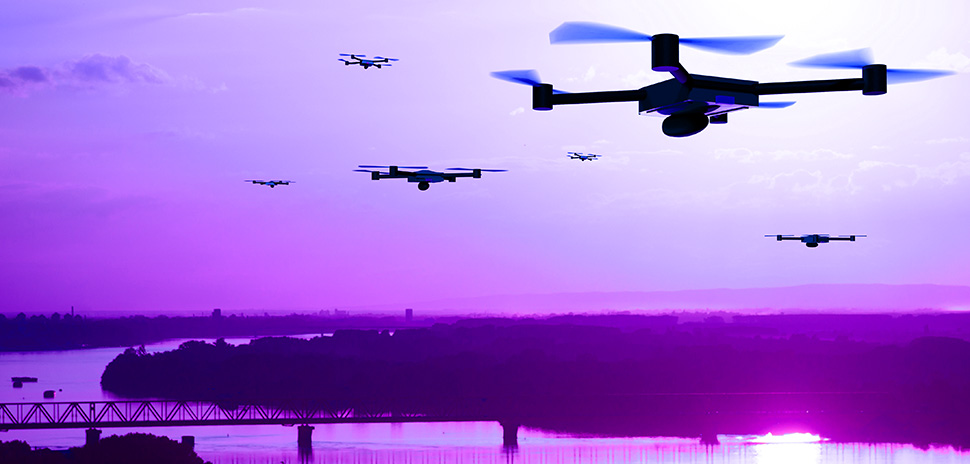In the skies over England and Scotland, drones are becoming a more and more common sight. That worries U.K. officials, who want to ensure that military, enterprise, and government drones can be safely tracked once out of visual line of sight. So how did a Dallas-area company get involved?
First, the U.K. government sponsored a long-distance drone trial by Neuron Innovations, a London-based aviation tech company. Using data fusion technology to build a mesh network, Neuron has developed an “aviation surveillance as a service” system to help drones seamlessly integrate into existing airspace.
Neuron then tapped Richardson-based Hedera Network’s Hedera Consensus Service to “gather, store, and order” the drone data, helping to provide a real-time “radar system” for drones in the trial.
“Until now, drones have had limited benefit for governments and private enterprises, because they could not be flown safely out of line of sight and therefore could not be used for long distance deliveries, transport, or inspections,” said Niall Greenwood, chief commercial officer of Neuron, in a statement.
“With this trial, leveraging Hedera Consensus Service, we’ve made unmanned, long-distance drone travel possible using safety-critical aviation infrastructure,” he added.
Neuron’s Greenwood: ‘No other public ledger has been fast enough’
Greenwood said Hedera’s service was essential to capturing the vast flood of data each drone flight generated.
“Each flight creates millions of data points, which no other public ledger has been fast enough to log and correctly order,” Greenwood said in the statement. “By leveraging the Hedera Consensus Service we can gather, store, and order this data immediately, giving us a real time ‘radar system’ for drones.”
Richardson-based Hedera Hashgraph CEO and co-founder Mance Harmon said Neuron accomplished an “extraordinary feat” in the trial by “allowing unmanned drones to safely exist in the sky.”
Using drones to transport essential equipment across long distances can be used in healthcare, national security, and a wide range of other applications, Harmon noted.
Over time, Neuron aims to provide a decentralized platform for mobility solutions including drones, air taxis, autonomous vehicles, and ground robots. The U.K. firm says it will do this by connecting sensors, vehicles, and management systems to provide a trusted network which can be used for data sharing, record keeping, and possibly even decision making.
Logging drone data in the U.K. trial
The U.K. drone trial was conducted in April and October at Port Montrose, Scotland, and Cranfield University, England, respectively. Neuron sensors logged data points on the drones’ location and direction while the Hedera Consensus Service provided logging and timestamping of the data from each drone onto its decentralized public ledger.
The trial—sponsored by the U.K. Department for Business, Energy, and Industrial Strategy—was part of series of drone-related experiments. The key result of the trial was successfully tracking drone flights once the unmanned vehicles were out of sight.
Neuron plans on deploying its drone sensor solution for all drone use cases with the potential to impact industry and supply chain in the U.K. and internationally.
Hedera Consensus Service provides a key ‘trust layer’
Businesses are building applications using standard frameworks or blockchain and distributed ledger options for privacy, cost, and agility benefits—but they are often siloed. That results in a need for a complex, centralized configuration process to achieve transaction ordering, Siloed applications also lack the foundational public trust element of Web 3.0.
Hedera’s Consensus Service provides a “trust layer” for applications and permissioned networks by creating a log of messages, the company says. The service receives messages, provides a trusted timestamp, and fairly orders the messages.
From COVID-19 vaccines to pharmaceutical tracking to banking
In addition to the Neuron drone trial, the Hedera Consensus Service has been adopted in the U.K. by Everyware and the National Health System to track the cold storage of COVID-19 vaccines. COVID-19 track-and-trace systems are also using the Hedera service through a collaboration with SAFE and Acoer for Arizona State University, E&I Cooperative, and major companies. In Bahrain, the service is being used for MVC’s track-and-trace system for pharmaceuticals.
As Dallas Innovates wrote last month, Hedera’s public ledger network was recently used in cryptocurrency banking as well. Shinhan Bank—South Korea’s second largest bank—completed the development of a proof-of-concept leveraging stablecoins in international remittances. The proof-of-concept utilized the Hedera Token Service and Hedera Consensus Service to test the issuance and distribution of stablecoins from one international bank to another.
David Seeley contributed to this report.
![]()
Get on the list.
Dallas Innovates, every day.
Sign up to keep your eye on what’s new and next in Dallas-Fort Worth, every day.


































































